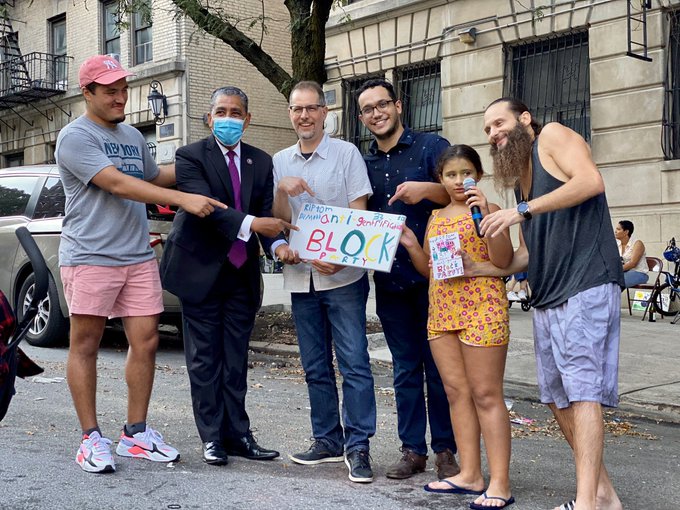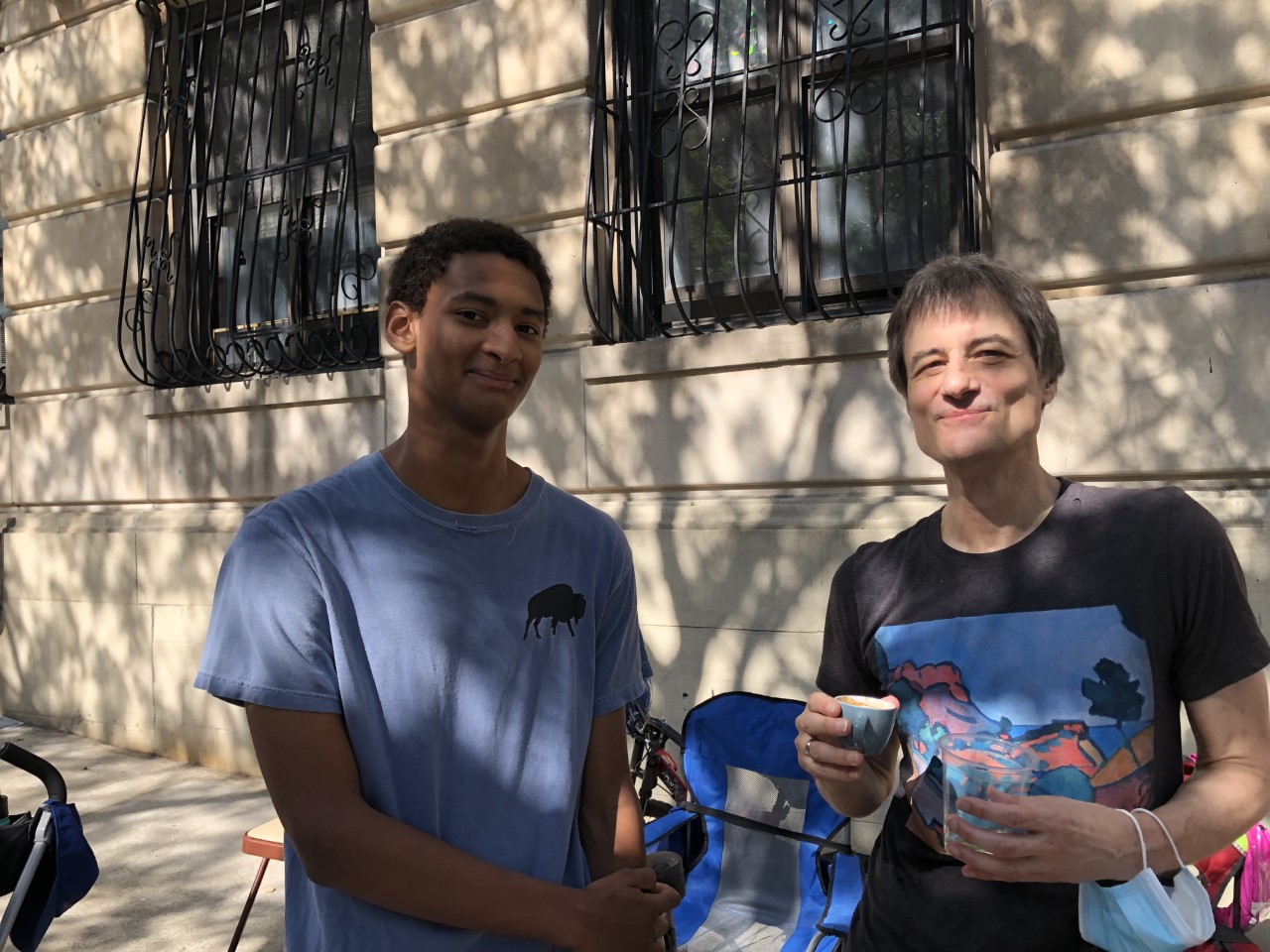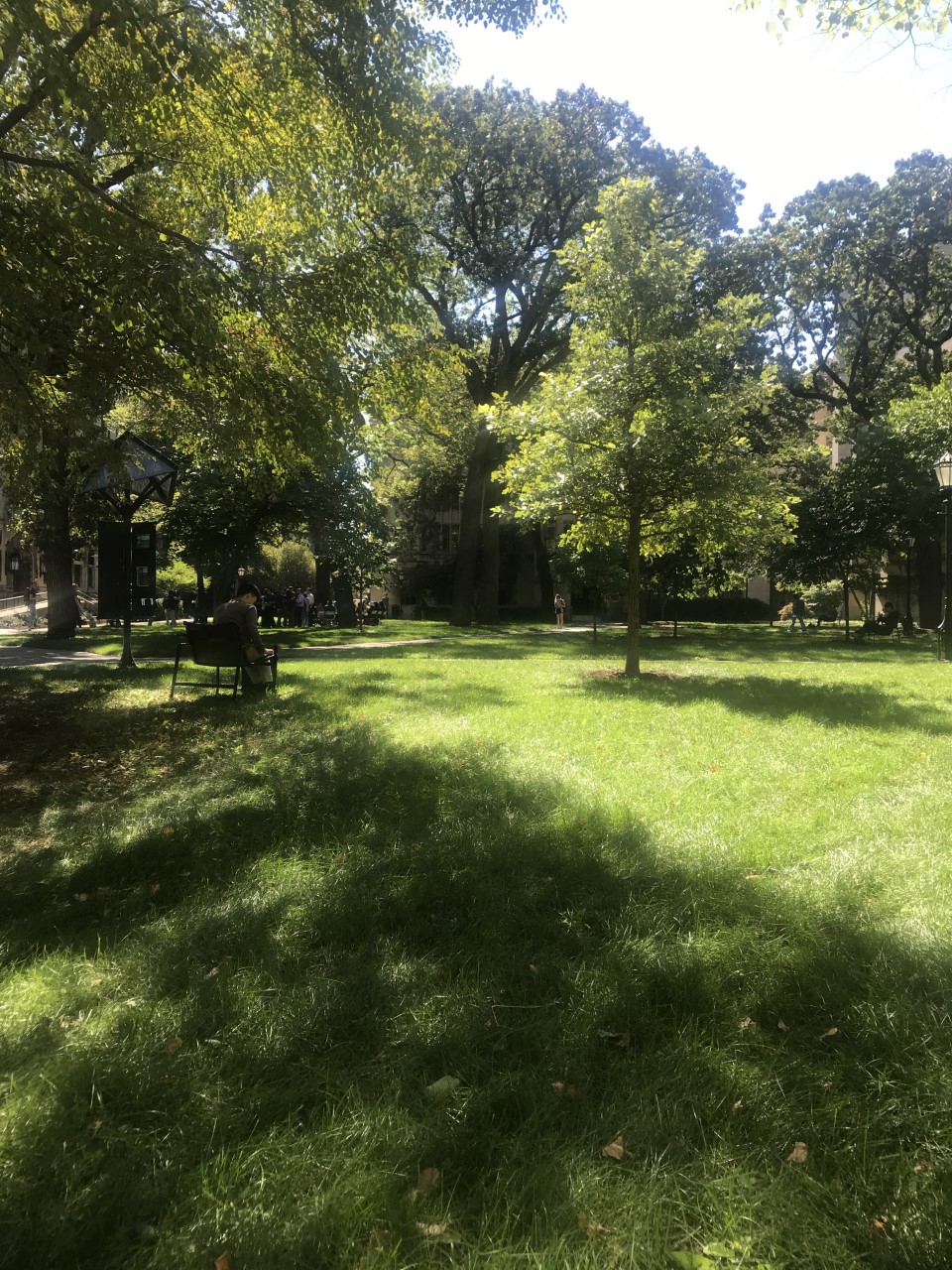Thanks to Columbia U’s expansion, a chump can now get a chi chi egg/sausage McMuffin for $10 in my hood. That bad deal goes down at Butterfunk Biscuit Co—one of four mini-restaurants in the deeply unfunky “Manhattanville Food Market” located on the first floor of a building in CU’s sterile new STEM complex just above 125th St. Don’t this…

make you want to go home to a Pre-Columbian West Harlem?
My nephew Jamie and his crew acted on that itch when they organized the 33rd Annual anti-Gentrification (or, as they put it more politely, “neighborhood preservation”) block party on Tiemann Place at the Harlem end of Claremont Ave. I don’t think the DJ played any Prince, but (as ever) the spirit of “Uptown” (slightly tweaked) danced in the street—“white, black…Dominican – everybody just-a-freakin’…” Though Marsha—who’s rocked every block party—had to solo since her longtime partner passed. Rona? (Not sure, but the virus hit the street hard.) David—Marsha’s non-dancer/amore, watched over her (and their puppy), with a blessed look rather than a male gaze, as she stepped to beats. My own meringue won’t swing it anymore (not that my hips ever did) so I watched him watch with the Hunters—art-lifers for whom I’d worn my Derain t-shirt (though their son’s friend had an eye too and dapped me up first). We agreed there wasn’t a sweeter person in this world than David as we reminisced about how he’d helped a bunch of us get a trashed apartment ready for an elder-hoarder my older brother Tom had spirited out of a nursing home. Three years on, that ninety year old Chinese lady—past fear of famine or fading away in an elder-warehouse—is still glad to be back in her own home, looked after by a caregiver from the block. Sophie took in the sun and scene from her wheelchair. I doubt she really knows how much David did to get her place in shape for her return. A master home-improver, he has a knack for teaching all thumbs sorts (like yours truly) how to be—or at least seem—useful.
I had my own hands full when my neighbor Phil Greene (First readers will probably recognize that name) arrived bearing a cup of home-brewed expresso for me. Not that I relied entirely on others for provision. As is my habit, I brought a couple bottles of Sancerre to the fair, pouring glasses for friends (and strangers). Took a few sips myself too and got a buzz to go with the expresso jitz.
It’s real kids, though, who are really juiced by our block party. Tiemann’s gentle slope is dreamy for younger riders mastering skateboards or scooters since its flat stretch at the crossroads slows their roll, making the final 3rd a safe rush. This year there were two bouncy castles along with the portable b-ball hoop. I took my shots and realized (all over again) when the DJ segued from “Finally” to “Show Me Love” that I might have never left the gym in my youth if it had been the custom to play music as you jacked up jumpers. B-ball wasn’t the only game in town. Someone set up a chess board for newbies like my son who’d locked on The Queen’s Gambit the way my gen read The Cincinnati Kid’s poker faces. Canny Leo, from the grand Rodriguez clan, went easy on my novice, before schooling the soon-to-be college boy. (Chess is surely the best way to get your ass kicked in the street!)
That board was a fine add-on to the party, but I had a harder time swallowing a hot wings-eating contest put on by a local bistro. The contest, which was funded by Shawn Abreu, the Democrats’ nominee to be our new City Council-person, lacked a certain flavor. It seemed to belong in a suburban mall (or the Manhattanville Food Market?) not on our block where the street fair’s food tables once featured Kim’s amazing Moussaka (which somehow tastes slightly sweet in memory) or Janet’s ingera or Mbayang’s Yassa or Mama Pres’s bread pudding. Abreu had one excellent staff person who grew up on our block and helped ease him into our crowd, but the fledgling pol’s own manner was slightly off-putting. We resist those who have designs on us (pace Henry James) and this young man in a hurry tried a little too hard to charm even as he didn’t seem all ears. I was happy to learn he’d often seen me back in the day at Morningside library with my infant son (though I was surprised to find he assumed my mixed race kid had been “adopted”).[1] I tried to say something to him about the block party’s back story—how it was started by rent-strikers who grasped they were defending themselves not only against rapacious landlords but against speculators looking to purchase apartments on a street primed for gentrification. Maybe I was being boring, but Abreu couldn’t make himself pretend to be into that past (though his bio cites his work as a tenants’ lawyer). His mentor, our old councilman and presumptive Manhattan Borough President, Mark Levine, was more subtle. He told my nephew he’d learned tons of organizing lessons from Tom of Tiemann. And he leaned in when introduced to Lynn Kraus—a stalwart of the block’s Tenants Alliance who knows its history as well as anyone alive. (Lynn and her husband Jeff provided quick and funny accounts of the Alliance’s achievements, which were truly historic, at my brother Tom’s funeral in 2018. See here.) Levine was alive to details of our familiars. Next time around I might urge him to slip around the corner at the top of Tiemann to check the plaque for Simone Weil—saintly author of The Need for Roots who lived in our neighborhood for a couple seasons when she was in exile from la France profonde. (Weil wasn’t born for America but she got into the habit of crossing into Harlem to attend church services and, according to one of her correspondents, “if she’d stayed in America she surely would’ve become a black.”) We’re hoping Levine will be able to keep his pre-Covid commitment to act on community organizer Luis Tejada’s suggestion that Tiemann Place be co-named Tom DeMott Way. The prospect of a sign for Brother Tom at the top of Tiemann near Weil’s plaque seems more than, ah, narratively apt. Though I’m afraid that coupling might seem less than epic to Columbia’s Agamemnon.
Levine and Abreu were joined at the Street Fair by Congressman Adriano Espaillat, which was a bit of a shock to us old-timers who recalled how Charlie Rangel (our previous Rep.) kept his distance from Tiemann Place’s community groups. If we were lucky! Word once got out that a member of the West Harlem Coalition was thinking of running against Rangel. The putative candidate probably had no chance. (He surely wouldn’t have had much money.) But rumor had it that Rangel acted just as powers-that-be usually do (see Simone Weil’s “The Poem of Force”). Our comrade had a city job as a court clerk and suddenly found himself in trouble with higher-ups. He ended up losing his gig, along with any thought of challenging Rangel. The bitterness remained and his life got twisted…
A block party is surely not the time to go with gall, but going home often entails revisiting wounds that linger. It’s true, too, our community hasn’t exactly won its fight to sustain a vital, affordable neighborhood. On this score, Weil had the prophetic goods: “It is true that our weakness could prevent us from defeating the force that threatens to overwhelm us. But that does not prevent us from understanding it. Nothing in the World can stop us from being lucid.”

Politicians in the middle, flanked by outliers from our odd hood—Jamie (with his daughter Shai) and Hugo, another son of Tiemann.
Truth will keep you free and not just when you’re facing power. After pols and Jamie gave short speeches, I was gratified when another compa took the mic to cite names of the lost, ending with a felt shout-out to our Tom. I wished this Dominican praise-singer had left it there, but he dropped the mic only after calling on vaxxed and un-vaxxed to lie down together. His loopy line was a reminder of how hard it is to translate rootsy culturalism into a workable politics.
I’ve written a bit about that problem in the past as I tried to think through the link between Simone Weil and the great American tribune of participatory party-politics and people’s dance musics, Charles Keil, who’s been picking up on messages to the grassroots ever since he brought Malcolm X to Yale in 1960 (just before he went on the road himself to write the classic ethnography, dedicated to Malcolm, Urban Blues). Weil’s and Keil’s rad conservatism remains an international resource for anyone out to trump brutal chauvinists (like Trump) and progressive globalists.
The notion that Weil’s life and work is fresher than ever informs a short new text, The Subversive Simone Weil, by Robert Zaretzky. LRB reviewer Toril Moi, though, has accused Zaretsky of domesticating Weil. She claims Zaretzky has turned Weil into “Simone of Suburbia.” Zaretzky (tongue in cheek) proposes to meet Moi in a suburban coffee shop and hash out their different readings of Weil. His quip reminds me there’s been a Starbucks on our block for years now (which, in turn, makes me yearn for the original Floradita that used to be around the corner from Tiemann on 125th St., where you could get 60 cent expressos, along with mofungo, banana omelets and oxtails on Thursdays). I’m not sure if my Weil is closer to Moi’s or Zaretsky’s. What matters more, I suspect, is that “the need for roots” isn’t an academic thesis to me. Thanks to my late brother, his wife Maria, and tenants in the struggle on Tiemann (who became my homies too), that imperative isn’t debatable; it’s personal.
Tiemann Place isn’t at the core of my son’s Apple—his “friend group” spans the city. (He knows the boroughs much better than me.) But my boy doesn’t see familial bonds as constraints…

Ben & Ben on Tiemann Place (Photo by Paul Hunter)
II
The street fair took place on my son’s last day in New York before we were due in Chicago to drop him off for his freshman year in college. When he broke out of the block party to get in a last run at a Riverside Park pickup soccer game, I went with him to catch a few elegiac kicks. Watching him play down below as I sat up high up looking out over the field toward the Hudson, I could feel him getting farther away…
I was just waking up from a nap on the plane the next day when he and his mom watched Chicago’s skyline and Great Lake come in view for the first time as we began our descent. Ben was feeling up even when our hotel turned out to be a motel (with cig smell in our stairwell) and Hyde Park’s 53rd St. restaurant row proved to be pretty generic. Kudos, btw, to Chicago-knowers who sent us to Medici bakery/eatery and the 57th St. Bookstore, which gave us lifts later in our trip. We all noticed how empty the streets are after dark in Hyde Park, though we didn’t realize that meant the place was less than safe. (We’re lucky my wife didn’t hear more about the recent wave of shootings there or she’d’ve insisted our freshman cut and run from Chicago.) For NYC-bound homebodies like us, it was an adventure to find our way around Hyde Park’s Hawk-swept streets and then scope out viridiansy enclaves on campus like this one…

My own mood, though, went from green to blue as my son led us around his new hood. I began to take in how much I’d come to lean on my boy over the past couple years. After my brother Tom died in ‘18, Ben, slowly but steadily, became my best buddy. We’d always done plenty of exploring together but there’ve been role reversals lately. My son is now beginning to serve more and more as my guide. Last season he directed me to (Eric Rohmer’s) summer seas around Brittany and (Aya Nakamura’s) Parisian nights. He kept steering me when we got to Chicago. As we were fixing up his room, he played Kingfish Ingram’s second album. So I came home from Chicago with Blues to help me cope with the Aftermath. Though there’s a hole now in my days no music can fill, not even when texts and emails come through from Chi-town. My wife is feeling the big empty even more intensely than me. She’s from a family of twenty children—her father had four wives—and, as first-born, she has a heavy sense of obligation to her Senegalese siblings. But she saved up all her mother-love for our only child. My son benefited from her extreme attentiveness. (Not that he didn’t miss a few jaunts along the way—no sleep-overs until he was a teen!) Baby boy not only avoided daycare, he never even had a baby-sitter. My wife can be a little too careful and she tends to keep a tight hold on her maternal feelings, spending her love in time-sensitive acts. (She financed my son’s post-infancy trip to Africa by working one winter in a miserable outbuilding near the end of the line in Brooklyn where she fixed broken cellphones under the eyes of foremen who acted like prison guards.) She bottled it in for the first couple of days in Chicago, focusing on college room-related errands etc., but a little rite got her to pour it all out. On our last day before Convocation, when frosh are welcomed to college and parents are invited to…leave, we gathered at a table where U people prompted fathers and mothers to write postcards to their kids, to be delivered after parents departed. My wife isn’t writerly, but her tears (and all of ours) came as she phrased her emotion, telling our son how much she’d miss the sound of his skateboard out on the street rolling home toward her…
The ceremony that followed was ok. While the new President of Chicago is a STEM man, meaning there wasn’t much chemistry between him and DeMotts, major “Remarks” were given by a Dean Boyer who spoke well about the University’s history. He told how his institution was rooted in the city of Jane Addams and a prioris that assumed making money you can’t spend isn’t what being dead’s about. (To translate Robert Hutchins’ classicism into a Haymarket-style lyric.) My kid and I were both down with this Dean’s September song, which put a morally serious spin on the U’s notorious tagline: “The place where fun goes to die.” Not that my kid is a proud grind. He hopes college will be a Weil thing: “The intelligence can only be led by desire. For there to be desire, there must be pleasure and joy in the work. The intelligence only grows and bears fruit in joy. The joy of learning is as indispensable in study as breathing is in running.”[2]
We got to walk with our freshman for a last stretch before they made us exit at a college gate. He went to be in his class photo while we looked into our son-less void. I didn’t handle the ritual leave-taking with much grace. As we tried to find our way through wet eyes to where we’d meet our taxi-to-the-plane, I overheard a co-ed—econ major, no doubt—telling a companion that “even in the best corporations you’ll find smart and stupid people.” I butted in as I passed by on the college walk—“Excuse me, but the distinction that counts is between lively people and bores…”
I didn’t add “like you,” but it seems I turn into mean Benj when I’m missing my boy. Not that there’s any excuse for my rudeness. Still, that young meritocrat’s smart crap brought home a Division Street at the center of the Chicago way. While the University has long linked joy in learning with democratic citizenship, it’s also known for upholding the dismal science. Ever since Milton Friedman got his Nobel, it’s been a go-to U for money-minded econ profs/students. And there’s evidence that suggests their ethos has bent heads who should’ve known better. I’d bet Barack Obama’s 12 years of teaching at Chicago was behind a jab he took at Art History majors during his presidency: “folks can make a lot more potentially with skilled manufacturing or the trades than they might with an art history degree.” (He apologized for his “glib” remark when he was called on it by an Art History prof.[3])
My kid got a hint of the U’s conflicted approach to rookie humanists on the first day of his first term. His Humanities Sequence professor advised him after class to avoid majoring in History since it was hard to get a job as a professor in that field. The teacher allowed he wasn’t too worried about his own career ops, musing about how he could always get a gig in Saudi Arabia since he spoke Arabic. (Dream bigger, man! There might be a spot at Istanbul’s Saudi Consulate.) His oversharing was definitely a downer. I could hear it in my son’s tone when he gave us the lowdown.
I checked in with a friend who’s a History prof to make sure I wasn’t mad to be mad at the crackpot realist who’d harshed my kid’s mellow. My History guy was with me:
I hate those shits who give up the game in the humanities. The self-loathing is unbelievable and the timing could not be worse with folks on the left saying higher ed has been a tool of oppression. I have begun thinking of it as survivor’s guilt (all those underemployed friends).
My kid is well past that daunting first day of class now. He knows he didn’t go to Chicago to land a job. He’s there to get lit. And he’s finding new friends to help him turn as much life as possible into conscious experience. He and a few others in his new crew woke up before dawn one day last week and headed down to the lake. Here comes their sun…

Notes
1 Not that I was bugged by Abreu’s paso en falso. He grew up in a working class Dominican family in Washington Heights and his blankness about the rangy intimate lives of Upper West Siders could be a good sign. It might just mean he’ll ID more with those in his district who live in genteel poverty (like me) than with winners in top tiers of the multiculti meritocracy.
2 Thanks to Toril Moi for underscoring that line of Weil’s.
3 The professor from University of Texas at Austin (per Politico) “received a letter from the White House with an apology scrawled in the president’s looping handwriting.
‘Let me apologize for my off-the-cuff remarks. I was making a point about the jobs market, not the value of art history. As it so happens, art history was one of my favorite subjects in high school, and it has helped me take in a great deal of joy in my life that I might otherwise have missed.’ He added, ‘So please pass on my apology for the glib remark to the entire department, and understand that I was trying to encourage young people who may not be predisposed to a four year college experience to be open to technical training that can lead them to an honorable career.’”
Obama once offered advice to elementary school children that beat his bottom-liner’s approach to older students. In a short back-to-school address back in 2009, which Republicans trashed as propaganda, Obama told kids: “You go to school to find out what you’re good at.” That line, which goes against the grade-grubbing grain, is worthy of Weil (who often refused to give grades when she was a teacher).